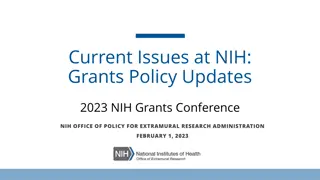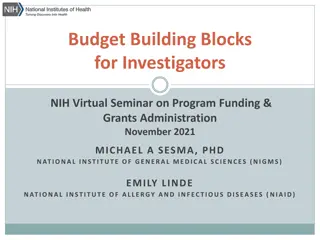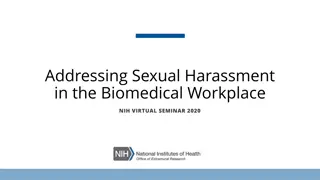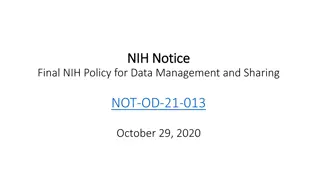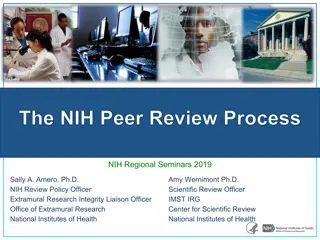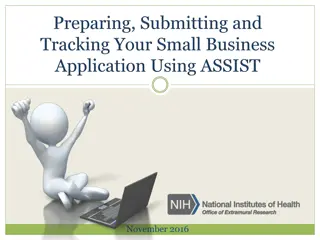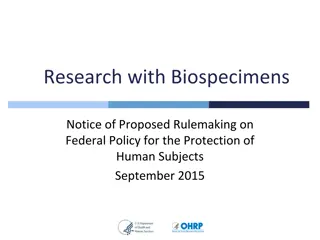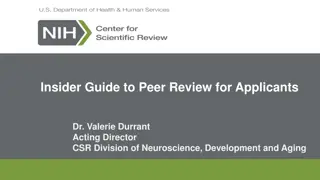Enhancing Human Subjects Research Through NIH Policy Changes
The National Institutes of Health (NIH) is implementing reforms and initiatives to improve the stewardship of research involving human subjects, particularly in the context of clinical trials. These changes include new forms for data collection, training in Good Clinical Practice, use of a single Institutional Review Board (IRB), and expanded registration requirements. Researchers conducting human subjects studies are encouraged to determine if their work meets the criteria for a clinical trial and to follow updated guidelines. The NIH is focused on enhancing transparency, accountability, and efficiency in clinical trial research.
Download Presentation

Please find below an Image/Link to download the presentation.
The content on the website is provided AS IS for your information and personal use only. It may not be sold, licensed, or shared on other websites without obtaining consent from the author. Download presentation by click this link. If you encounter any issues during the download, it is possible that the publisher has removed the file from their server.
E N D
Presentation Transcript
Doing Human Subjects Doing Human Subjects Research? Research? Changing NIH Policies May Impact You
Reforms & Initiatives To enhance the stewardship of research involving human subjects, NIH is implementing the following: All Research Involving Human Participants Research that Meets the NIH Definition of a Clinical Trial New forms to collect human subjects information Training in Good Clinical Practice (GCP) Clinical trial-specific Funding Opportunity Announcements (FOAs) Use of a single Institutional Review Board (IRB) for multi-site studies New review criteria Certificates of confidentiality for all research that uses identifiable, sensitive information Expanded registration and results reporting in ClinicalTrials.gov
NIH Initiatives to Enhance Clinical Trial Stewardship Clinical Trial FOAs Enhancing Clinical Trial Stewardship at NIH Good Clinical Practice Registration & Reporting Accountability Transparency Efficiency Dissemination New Single IRB Application Forms Clinical Trial Review Criteria Learn more at https://grants.nih.gov/policy/clinical-trials.htm
NIH Might Consider Your Human Subjects Research to be a Clinical Trial Does your study Involve one or more human subjects? Prospectively assign human subject(s) to intervention(s)? Evaluate the effect of intervention(s) on the human subject(s)? Have a health-related biomedical or behavioral outcome? If yes to ALL of these questions, your study is considered a clinical trial https://grants.nih.gov/ct-decision/ Unsure how to answer the questions? We have a tool that can help! https://grants.nih.gov/ct-decision/
Identifying Whether NIH Considers Your Study to be a Clinical Trial is Crucial It impacts whether you need to: Respond to a clinical trial-specific FOA Address additional review criteria specific for clinical trials Register and report your clinical trial in ClinicalTrials.gov
Identifying the Right Funding Opportunity Announcement (FOA) is Key Due Dates on or after January 25, 2018 All clinical trial applications MUST be submitted to an FOA that allows clinical trials How to determine if an FOA accepts clinical trials? 1. Refer to Section II. Award Information 2. Indicated in FOA title (new FOAs only) Tip: Check your FOA at least 30 days before the due date for any updates
Good Clinical Practice (GCP) Training All NIH-funded investigators involved in the conduct, oversight or management of clinical trials Who: What: Investigators are expected to receive Good Clinical Practice training Why: To assure the safety, integrity, and quality of clinical trials How: Through a class or course, academic training program, or certification from a recognized clinical research professional organization When: Effective January 2017. Training should be refreshed every 3 years See https://grants.nih.gov/policy/clinical-trials/good-clinical-training.htm
Clinical Trial Specific Review Criteria FOAs will include additional criteria: Scored Review Criteria Significance Investigator Innovation Approach Environment Read the FOA carefully and be sure your application addresses the review criteria appropriately Additional Review Criteria Study Timeline & Milestones
New Application Packages (FORMS-E) Due Dates on or after January 25, 2018 FORMS-E Application Packages is REQUIRED (including new Human Subjects and Clinical Trials form) PHS Human Subjects and Clinical Trials Information Form Consolidates information from multiple forms Incorporates structured data fields Collects information at the study-level Be sure you are using the correct application forms for your due date. FORMS-E will be available October 2017. See https://grants.nih.gov/policy/clinical-trials/new-human-subject-clinical-trial-info-form.htm
Changes to the Appendix Policy Since the new Human Subjects and Clinical Trials Information form collects key elements from the protocol, the optional protocol submission will be removed from the Appendix Policy. Due Dates on or after January 25, 2018 Parent FOAs IC issued FOAs Protocols and other materials allowed only when specified as required in the FOA Will NEVER allow inclusion of the protocol in the application If the protocol is included, the application will be sent back See NIH Guide Notice: https://grants.nih.gov/grants/guide/notice-files/NOT-OD-17-098.html
Registering & Reporting NIH-funded Clinical Trials in ClinicalTrials.gov Who: All clinical trial applications requesting support for a trial that will be initiated on/after January 18, 2017 What: Register and report the results of trials in ClinicalTrials.gov Why: Increase the availability of information about clinical trials and their results to the public in a timely manner When: Effective for applications due on/after January 18, 2017 See https://grants.nih.gov/policy/clinical-trials/reporting/steps.htm
Single Institutional Review Board (sIRB) Policy for Multi-site Research Domestic multi-site non-exempt human subjects research studies will require a single IRB of record Key Dates Grants: Applications due on or after January 25, 2018 Contracts: Solicitations published starting January 25, 2018 Exceptions sIRB not applicable for Career Development (K), Research Training (T), or Fellowship (F) See https://grants.nih.gov/policy/clinical-trials/single-irb-policy-multi-site-research.htm
Updated Certificates of Confidentiality (CoC) Policy Effective October 1, 2017 - CoCs will be issued automatically for any NIH-funded project using identifiable, sensitive information that was on-going on/after December 13, 2016 Eliminates the need for NIH funded investigators to apply for a CoC Enhances the privacy protections of individuals participating in NIH-funded research Requires investigators to only disclose information under specific circumstances Applies to NIH awards funded wholly, or in part, by NIH Disclosure restrictions also apply to anyone who receives a copy of identifiable sensitive information protected by the policy, even if they are not funded by NIH CoC is issued as a term and condition of award (no physical certificate) Learn more at https://humansubjects.nih.gov/coc/index





